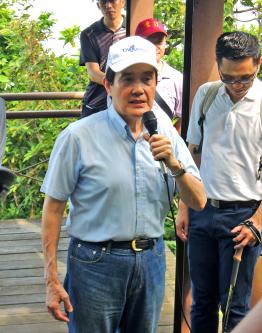Lawyers Huang Ti-ying (黃帝穎) and Cheng Wen-lung (鄭文龍) yesterday panned the Taipei District Prosecutors’ Office for rejecting a request by several civic groups to prohibit President Ma Ying-jeou (馬英九) from leaving the country amid allegations of abuse of power and corruption.
Huang, along with the Taiwan Association of University Professors, the Taiwan Forever group and the Northern Taiwan Society, on April 26 lodged a formal complaint with the Taipei office against Ma.
They accused Ma of profiting the Farglory Group (遠雄集團) in the scandal-dogged Taipei Dome project during his term as Taipei mayor and instigating former prosecutor-general Huang Shih-ming (黃世銘) in 2013 to leak details in a controversial wiretapping investigation of former legislative speaker Wang Jin-pyng (王金平), while questioning reports of unexplained increases in his personal wealth while in office.
The groups asked the office to ban Ma, who is to step down on Friday next week, from leaving the country to secure potential evidence.
However, the office turned down the request, saying that Huang Ti-ying and the civic groups were not a “legal entity” as defined in Article 219, Clause 1, Item 1 of the Code of Criminal Procedure.
Huang Ti-ying blasted the office’s decision, saying it was “politically motivated.”
He said the complaint the groups filed served as a “notice” to prosecutors that Ma might be linked to prosecutors’ investigations into the Taipei Dome and Huang Shih-ming cases.
“Following the precedent set by the office during its investigation into former president Chen Shui-bian’s (陳水扁) case, prosecutors should know that Ma, who has a green card and two daughters who have US citizenships, and, as president, is familiar with possible channels of escape, could cause significant delays to the prosecution were he allowed to leave the country,” Huang Ti-ying said.
Ma has said he has not renewed his green card, which has therefore been nullified.
He questioned the timing of the prosecutors’ response, “coming eight days before Ma leaves the Presidential Office,” and said that prosecutors should look after the interests of the “victim in this case, which is the whole nation.”
Cheng said the office’s decision contravened normal procedures.
The complaint was a notice to prosecutors and the office should prepare to undertake a possible investigation instead of rejecting the request at this point.
“The rejection has made us question the office’s motives. It also goes to show that although Ma is stepping down [as president], he still has tight control over the nation’s prosecutorial and investigation system,” Cheng said.
Ma has accrued quite a number of cases during his time as Taipei mayor and two terms as president, and has clearly been implicated in some cases, such as the ones involving the Taipei Dome and Huang Shih-ming, the lawyer added.
Source: Taipei Times - 2016/05/14





















